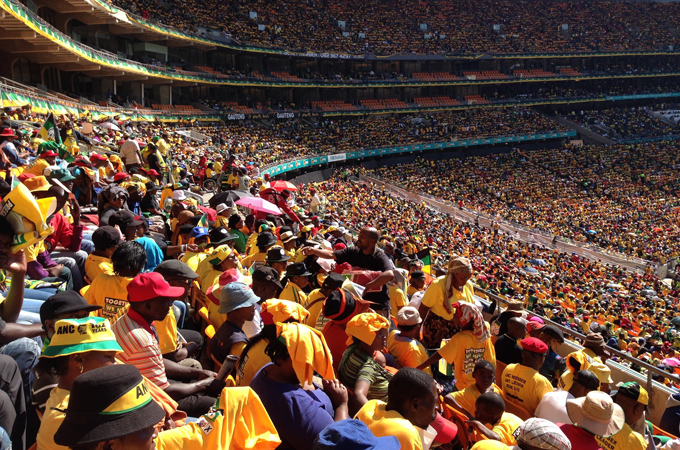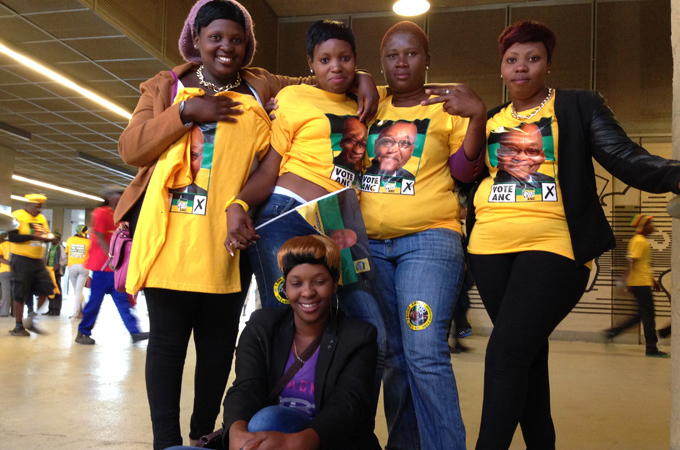Despite criticisms support for ANC endures
Once a beacon of hope, South Africa’s ANC has become a source of disenchantment, yet is still tipped to win elections.

Bekkersdal, South Africa – Bright Masakona says he hates the African National Congress. The 38-year-old pastor from the township of Bekkersdal, some 50km outside Johannesburg, says the party was buried along with the coffin of anti-apartheid icon Nelson Mandela.
“In the state of being liberated, we are in exile now,” Masakona says.
He is adamant the ANC is an outmoded political machine in South Africa, further stymied by mismanagement, arrogance and corruption. While convinced it is time to move on from the ANC, deciding which party to vote for in Wednesday’s general election has proved a difficult decision.
“I feel like I am in a storm, and I don’t know which direction to turn,” he said.
The ruling ANC party, once considered the beacon of hope and progress on the African continent, has become increasingly synonymous with bitter tales of corruption, economic mismanagement and effervescent arrogance. With President Jacob Zuma accused of economic malpractice even as 25 percent of the population remains jobless, idle and frustrated, the maturation of South Africa’s democracy has been marred by disappointment.
“There was a lot of hope in 1994, but it has been downhill ever since Mandela finished his term,” political cartoonist Nanda Soobben says. “There are so many different ways of seeing the country in the future, but none of them look good.”
Spoiling votes
 |
| Thousands of ANC supporters rally ahead of Wednesday’s vote [Azad Essa/Al Jazeera] |
In an unprecedented editorial last week, South Africa’s Mail & Guardian asked the population to “vote tactically… to use your vote to dilute overweening political power”.
“Never before has the M&G urged readers to oppose the ANC. But we do so now because the aim is to make the ANC more effective and responsive.”
Similarly, former ANC member and intelligence minister Ronnie Kasrils and a host of high-profile civil society members launched a campaign last month asking voters to spoil their vote.
The “Sidikiwe! Vukani!” campaign argues that the ANC has lost its way and its power needs to be checked. Kasrils drew scathing criticism from opposition parties while Zuma, for his part, described the campaign as “a very funny thing”. The movement has since changed its emphasis to voting for other parties – and spoiling ballots as a last resort.
The campaign garnered enthusiastic coverage on both social and traditional media. But while Kasrils’ campaign has been a source of annoyance to the ANC, it has failed to resonate with many voters.
In the townships and communities outside the reach of English-speaking media, many haven’t even heard of it, though some communities are planning their own stay-away-from-voting efforts.
Slow pace of change
Bekkersdal township has endured long-drawn protests against poor delivery of government services over the past 10 months. Residents say they are not voting because they haven’t seen change for the past 10 years. Here, voter-registration stations were petrol bombed as angry residents tried to discourage voting.
“I will not be voting because I do not see hope in any political party,” Nkululeko Magagule, 25, says. “If I did vote, I would vote for the EFF [Economic Freedom Fighters party] because they are the only political party talking about change.”
But even as South Africans grow increasingly frustrated with the slow pace of change following almost five decades of apartheid, there is unlikely to be a major shift at the ballot box.
The rise of the EFF under Julius Malema is likely to win some support at the polls, while the Democratic Alliance (DA), in its sustained effort as the official opposition, will likely coax at least as many votes as it did in the last election. In 2009, the ANC won 65.9 percent of the vote, while the DA managed 16.6 percent.
If polls are to be believed, the ANC will manage about 60 percent of the vote at Wednesday’s election and the DA some 20 percent.
Understanding the continued support for the ANC is not difficult.
Jabulani Radebe, a 32-year-old educator from Johannesburg, admits that while the ANC has become arrogant and the activities of its president are questionable, it is still the only party he can relate to.
“The ANC represents my own aspirations and has taken the country forward,” he said.
The DA’s inability to represent the aspirations of black South Africans could well be the party’s undoing, as it struggles to make inroads into the ANC’s core support base.
“The DA might be a good organisation and the conceptual differences between them and the ANC might be minimal, but they are often patronising and suffer lack of penetration,” says Ebrahim Fakir, a political analyst.
Making things right
Another ANC supporter, Irene Masuku, 56, describes the ANC as “home”, adding “there is no home that doesn’t have its problems”.
“The ANC will try to correct those mistakes,” she says of the failure to create enough jobs, or on accusations of nepotism and corruption.
Observers say while there is much talk of loyalty being the driving force behind the ANC, there is a tendency to forget the gains of the past 20 years.
Fakir says despite the rhetoric, many people’s lives in the lower echelons of South African society have improved.
“People have experienced a change in their lives, like it or not, this is a fact. South Africa is the largest welfare state in sub-Saharan Africa… Significant changes have happened at the lower level.”
The ANC is no by means a party of the past. A mammoth 100,000 strong rally in Johannesburg on Sunday to conclude its election campaign bore testimony to the enduring appeal of the ANC. Supporters insist the party is still the first port of call for voters, having delivered freedom and changed the lives of so many black South Africans over the past two decades.
Any alternatives?
Radebe says new parties will come and go, but discounting ANC as a pantheon of South African history is disingenuous. After all, the ANC is a large, fluid organisation with multiple identities. It holds the “liberation from white rule” tag and is considered close to the labour movement.
In contrast, the vast conglomeration of opposition parties – 28 parties contesting the national election – are still, 20 years later, unable to vie with the trust the majority of South Africans have shown for the ANC.
Despite its flaws, most South Africans still can’t imagine a country without ANC at the helm. And while the EFF has raised new, difficult questions over the ANC’s economic management, the party is still a political newcomer.
 |
| Rebecca Mokoema, 23, (second from left) beams as she talks about the ANC [Azad Essa/Al Jazeera] |
While appreciating the plethora of parties contesting the elections, Justin Haddon, 22, an international relations student in Johannesburg, describes the situation as “gridlocked”. His father is a politician in the DA – a party Haddon is reluctant to back because “they are merely in opposition to the ANC”.
But he has little trust in the ANC’s leadership. And when it comes to the smaller parties, he says they are too inconsequential.
Tahepiso Matuludi, 31, faces a similar conundrum. The receptionist from Johannesburg says she has “lost trust in the ANC, who have become self-centred and selfish”. She says she fully understands why people may stay away from the polls or spoil their vote.
“People would prefer to vote for the ANC but are disappointed, and they don’t trust the other parties. I didn’t register because I was so confused… Maybe if I could vote now, I would choose the DA, but I don’t know, something says I wouldn’t.”
Rebecca Mokoema, 23, beams as she sits down to talk about the ANC. “I am thrilled because the ANC is going to win. I am living free. I am born free.”
But back in Bekkersdal township, Pastor Masakona maintains he no longer has patience for the ANC. He says he’s tired of the lies, the endless wait for basic services, and the lack of integrity of its politicians.
“Since Nelson Mandela passed on, he has passed on with the ANC. The ANC is buried,” Masakona says.